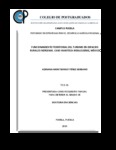| dc.contributor.author | Pérez Serrano, Adriana Montserrat. | |
| dc.creator | PEREZ SERRANO, ADRIANA MONTSERRAT; 175478 | |
| dc.date.accessioned | 2015-05-25T18:29:13Z | |
| dc.date.available | 2015-05-25T18:29:13Z | |
| dc.date.issued | 2015 | |
| dc.identifier.uri | http://hdl.handle.net/10521/2608 | |
| dc.description | Tesis (Doctorado en Ciencias, especialista en Estrategias para el Desarrollo Agrícola Regional).- Colegio de Postgraduados, 2015. | es_MX |
| dc.description.abstract | La viabilidad de las iniciativas de turismo en espacios rurales indígenas implica identificar las potencialidades del territorio; así como las necesidades, perspectivas, capacidades y limitaciones de los diversos actores que interactúan en el espacio. El objetivo de la presente investigación fue analizar el funcionamiento del fenómeno turístico en la región de la Huasteca Hidalguense para validar su potencialidad turística, conocer las características de la demanda e identificar los factores que inciden en la competitividad de las empresas comunitarias que operan servicios turísticos en la región. Los resultados muestran que, la dotación de recursos naturales y culturales le proporciona potencialidad turística a la región; no obstante presenta deficiencias en infraestructura general y de servicios. La caracterización de la demanda indica que la mayoría de las personas que visitan la Huasteca son turistas nostálgicos, cuya motivación principal es la de visitar la región para fortalecer sus relaciones familiares. Esto ha permito identificar a los turistas como jóvenes adultos, pertenecientes a una clase social media y media-baja y que no utilizan los servicios de alojamiento y restauración. Finalmente, se valoró el nivel de competitividad de las empresas comunitarias mediante la construcción de un modelo y un índice de competitividad rural turística, esto permitió identificar que el nivel de competitividad de las empresas comunitarias está dado por el conjunto de factores internos y externos, donde los primeros tienen mayor influencia en la valoración de la competitividad. _______________ TERRITORIAL OPERATION OF INDIGENOUS TOURISM IN RURAL AREAS. CASE HUASTECA HIDALGUENSE, MÉXICO. ABSTRACT: The viability of tourism initiatives in indigenous rural areas involves identifying the region's potential; and the needs, perspectives, capabilities and limitations of the various actors interacting in space. The objective of this research was to analyze the performance of tourism in the region of the Huasteca Hidalguense to validate its tourism potential, know the characteristics of demand and identify factors that affect the competitiveness of communitary enterprises operating tourist services in the region. The results show that the endowment of natural and cultural resources provides tourist potential of the region; nevertheless it presents deficiency in general infrastructure and public services. The characterization of the demand indicates that most people who visit the Huasteca are nostalgic tourists, whose main motivation is to visit the region to strengthen their family relationships. This has enabled identification of tourists as young adults, of middle and middle-lower class who do not neither accommodation nor catering services. Finally, the level of competitiveness of communitary enterprises was assessed by constructing a model and an index of tourist rural competitiveness, it identified that the level of competitiveness of communitary business is given by the set of internal and external factors, where the first ones have greater influence on the assessment of competitiveness. | es_MX |
| dc.description.sponsorship | Consejo Nacional de Ciencia y Tecnología (CONACyT). | es_MX |
| dc.language.iso | spa | es_MX |
| dc.rights.uri | http://creativecommons.org/licenses/by-nc-nd/4.0 | |
| dc.subject | Competitividad rural | es_MX |
| dc.subject | Demanda turística | es_MX |
| dc.subject | Potencial turístico | es_MX |
| dc.subject | Rural competitiveness | es_MX |
| dc.subject | Tourism demand | es_MX |
| dc.subject | Tourism potential | es_MX |
| dc.subject | Estrategias para el Desarrollo Agrícola Regional | es_MX |
| dc.subject | Doctorado | es_MX |
| dc.title | Funcionamiento territorial del turismo en espacios rurales indígenas Caso Huasteca Hidalguense, México | es_MX |
| dc.type | Tesis | es_MX |
| Tesis.contributor.advisor | Juárez Sánchez, José Pedro. | |
| Tesis.contributor.advisor | Ramírez Valverde, Benito. | |
| Tesis.contributor.advisor | Estrella Chulím, Néstor Gabriel. | |
| Tesis.contributor.advisor | Ramírez Valverde, Gustavo. | |
| Tesis.contributor.advisor | Propín Frejomil, Enrique. | |
| Tesis.contributor.advisor | César Dachary, Alfredo A. | |
| Tesis.date.submitted | 2015 | |
| Tesis.date.accesioned | 2015-05-25 | |
| Tesis.date.available | 2015-01-26 | |
| Tesis.format.mimetype | pdf | es_MX |
| Tesis.format.extent | 2,622 KB | es_MX |
| Tesis.subject.nal | Pueblos indígenas | es_MX |
| Tesis.subject.nal | Indigenous peoples | es_MX |
| Tesis.subject.nal | Entorno socioeconómico | es_MX |
| Tesis.subject.nal | Socioeconomic environment | es_MX |
| Tesis.subject.nal | Entorno sociocultural | es_MX |
| Tesis.subject.nal | Sociocultural environment | es_MX |
| Tesis.subject.nal | Política pública | es_MX |
| Tesis.subject.nal | Public policy | es_MX |
| Tesis.subject.nal | Huasteca Hidalguense, Hidalgo, México | es_MX |
| Tesis.rights | Acceso abierto | es_MX |
| Articulos.subject.classification | Turismo | es_MX |
| dc.type.conacyt | doctoralThesis | |
| dc.identificator | 6 | |
| dc.contributor.director | JUAREZ SANCHEZ, JOSE PEDRO; 123113 | |


